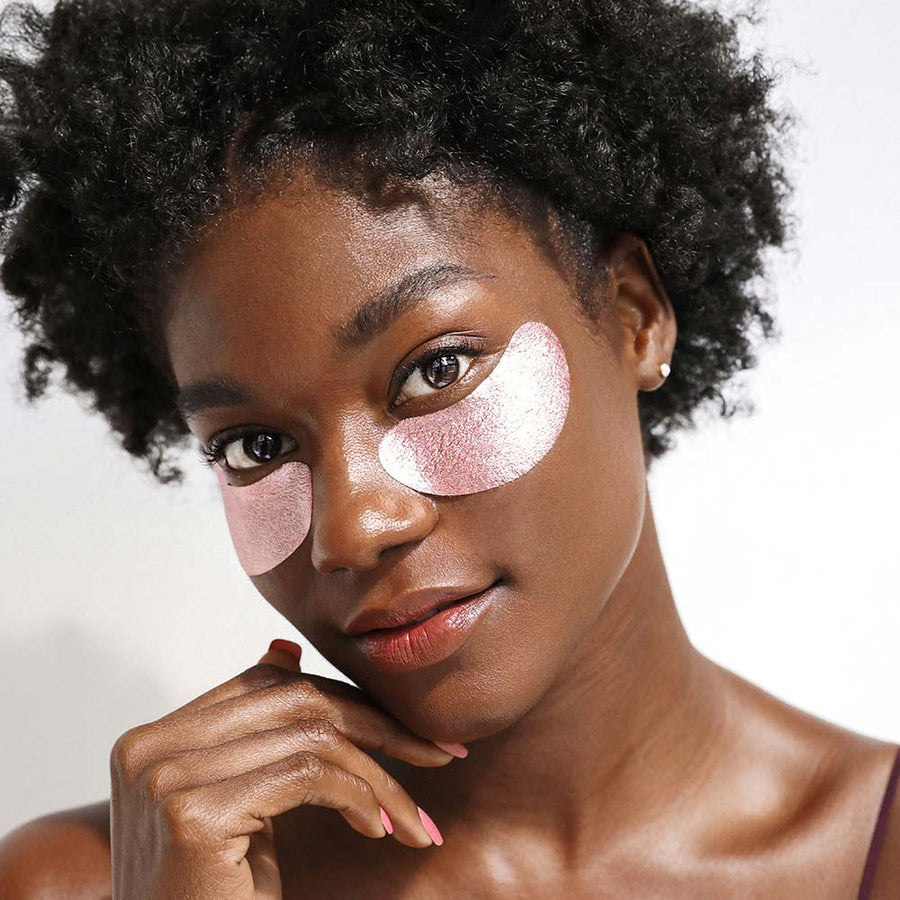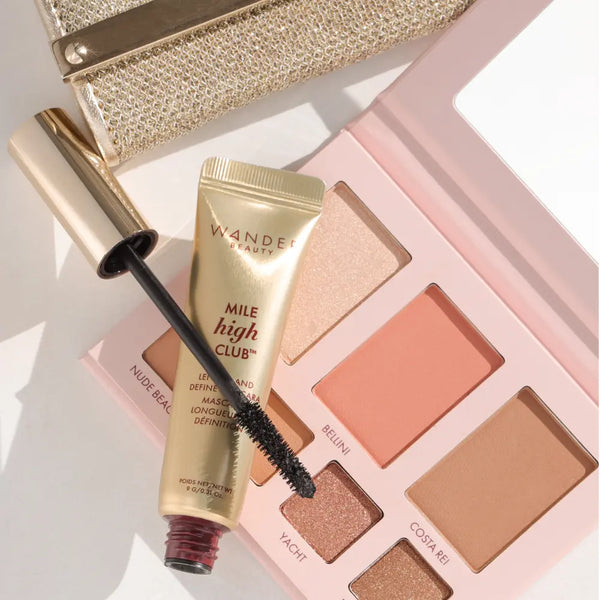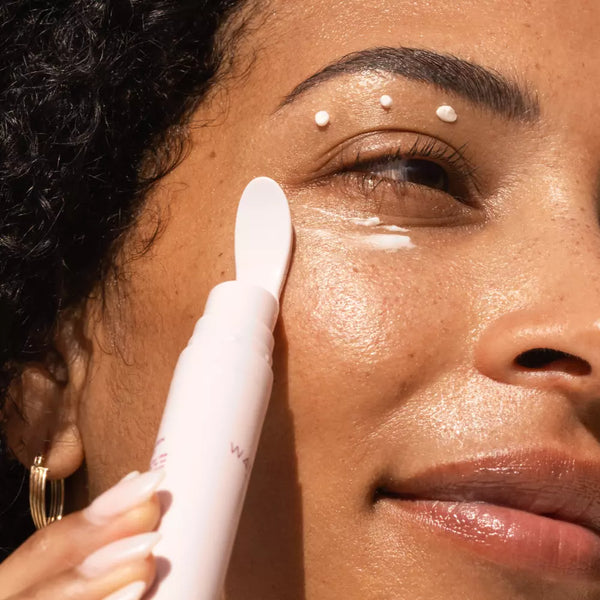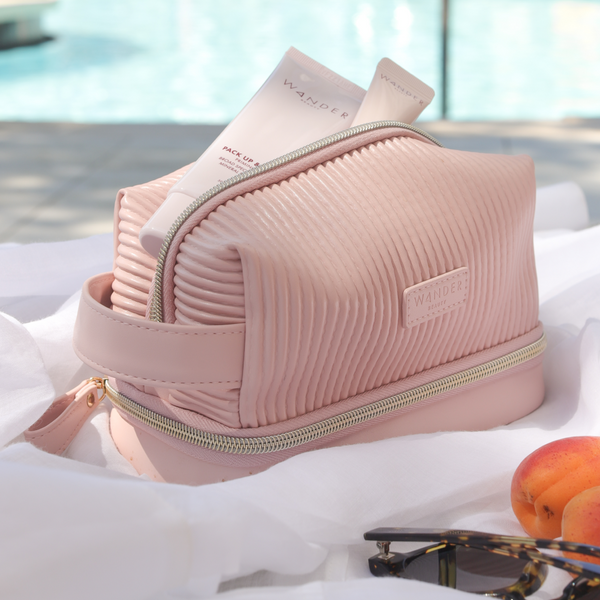5 Ways To Improve Your Sleep and Reduce Dark Circles
By Wander Beauty | Aug 08, 2022
It's 7 am, and you're ready to tackle the day with confidence. Only, you slept terribly and meet a puffy-eyed, dark and dull version of yourself in the bathroom mirror. You grab your trusty concealer but pause for a moment to google “How to get rid of dark circles” because you've seen this face one too many times, and it's time for a more lasting change.
The skin under the eyes is thin and delicate, making it more susceptible to visible indications of lack of sleep, dehydration, and even nutritional deficiencies. Join us as we share our top tips on how to improve sleep, reduce the appearance of dark circles, and use makeup to brighten your complexion.
Tips to improve your sleep
If poor sleep hygiene is what's causing dark circles under the eyes, try out these helpful tips for better quality sleep.
1. Stick to a sleep schedule
You have work routines, gym schedules, and daily chores, and prioritizing sleep is just as important, considering that adequate sleep not only reduces the appearance of dark circles under eyes, but is also essential to your health, productivity, and general wellbeing. Developing a regular sleep schedule will train and prepare your body for a good sleep cycle.
Things to factor in when planning your sleep schedule include what time you’d need to go to bed to get seven to eight hours of sleep and wake up at your preferred hour, factoring in the time it may take to fall asleep. You may also want to eliminate long daytime naps, and put together a bedtime routine that will help you relax and unwind in the hours before hitting the hay.
2. Regulate your circadian rhythm
Your circadian rhythm is your body's natural internal clock. It affects your brain and hormones, passing messages on to your body about when it's time to wake up and when it's time to sleep. To regulate your circadian rhythm, it's important to both get enough bright light during the day and reduce blue light exposure at night.
Natural sunlight or bright light gives you energy during the day, and studies have shown that adequate bright light exposure during the day improves sleep quality and duration and reduces the time it takes to fall asleep by up to 83%!
Electronic devices like smartphones, tablets, and computers emit large amounts of blue light. This light tricks the body into thinking it's still daytime, which disrupts the release of hormones like melatonin, which helps you relax and fall into a deep sleep. To reduce blue light exposure at night, be sure to download an app that blocks blue light on your smartphone, tablet, and laptop. It's also best to turn off all bright lights and stop watching TV at least two hours before going to bed.
3. Avoid caffeine after 4pm
We all know the benefits of caffeine – laser-like focus, increased energy, and improved athletic performance. However, because caffeine is so stimulating, it's best avoided in the late afternoon and evening, especially for those who have trouble sleeping. The effects of caffeine can last up to six to eight hours, so be sure to steer clear of coffee, black and green tea, energy drinks, cacao, and supplements that contain any caffeine, and instead opt for relaxing drinks like herbal teas or a turmeric latte in the hours before bedtime.
4. Try acupressure and herbal supplements
Natural sleep remedies that can help induce relaxation include Ginkgo Biloba, Valerian root, lavender essential oil, and magnesium. Melatonin is the primary sleep hormone, making it another popular sleep aid. Speak to your healthcare provider to determine the best dosage for you. Other alternative practices include yoga and meditation, reflexology, and acupressure.
5. Listen to a sleep podcast
If it's falling asleep you have trouble with, try trading in Netflix for a sleep podcast. Podcasts such as Get Sleepy, The Sleep Meditation Podcast, and Sleep With Me combine tranquil music, stories, and autonomous sensory meridian response (ASMR) triggers to help lull you into a dreamy state ready for deep relaxation and restful sleep.
Lifestyle tips to reduce dark circles
While poor or inadequate sleep is a huge contributing factor to dark, puffy eyes, there can be other factors at play. If you're sleeping soundly but still struggling with under-eye circles, other lifestyle factors may be to blame. Try out some of the following tips.
1. Sleep on your back
While you may be getting adequate sleep, sleeping in the wrong position may be contributing to puffy eyes! Sleeping on your side or stomach can cause fluid to pool under the eyes, worsening puffiness in the area. To reduce swelling and inflammation under the eyes in the mornings, try sleeping on your back and elevating your head slightly.
2. Consume iron-rich foods
Because low levels of iron and vitamin B12 result in a poor supply of oxygenated blood, these nutritional deficiencies can cause dark circles under the eyes. Be sure to include nutrient-rich foods such as shellfish, spirulina, liver, legumes, and dark chocolate in your diet, or take a supplement.
3. Use eye masks and serums
The best eye patches for dark circles can visibly brighten, hydrate, and reduce puffiness while minimizing the appearance of dark circles. Our best under-eye mask makes use of calendula extract to de-puff tired eyes, camu camu extract to brighten the under-eye area, hyaluronic acid to diminish the appearance of fine lines, and aloe leaf extract to cool and soothe the area, all in just 10 to 15 minutes. Skincare products rich in vitamin C, such as our Sight C-er Vitamin C Concentrate, can also help hydrate and brighten the delicate skin under the eye, making them helpful additions to your skincare routine.
4. Cut down on nicotine and alcohol
You probably use cosmetic products rich in antioxidants and with ingredients that help to fight free radical damage,
Not only does smoking produce substances that diminish the skin's elasticity and the collagen that keeps skin firm and plump, both smoking and alcohol consumption negatively affect your sleep cycles and hormones. These substances can alter melatonin production and decrease human growth hormone (HGH) at night, which plays a key role in your circadian rhythm and other key functions. This makes limiting the consumption of nicotine and alcohol, especially in the evenings, essential.
5. Stay hydrated
The skin around your eyes is especially thin and vulnerable to dehydration, which can cause both a dull, sunken look or puffy eyes if your diet is high in salt. Drinking adequate amounts of water throughout the day will help hydrate your body, reducing the effects of dehydration on the under-eye area.
Makeup to the rescue!
If you're reading this the morning of an important business meeting thinking, “I’ll definitely give these a try tonight, but how do I cover dark circles right now!?” worry not! While small lifestyle changes are the key to improving dark circles in the long term, makeup is your best friend when you need a more immediate solution.
Step 1: Prep – After cleansing your face, apply a toner to hydrate the skin and even skin tone. Follow this with a moisturizer before applying your makeup.
Step 2: Conceal - The best concealer for dark circles will be one that is two to three shades lighter than your foundation. Apply the concealer stick in an upside-down triangle shape, rather than a half moon, along the bottom of your under-eye bags to create a visual lift that will help conceal any ballooned areas and diminish dark patches.
Step 3: Blend – Apply your usual foundation, making sure to blend it in effectively using either a brush or sponge. You shouldn't be able to see any defined lines.
Step 4: Brighten – An eyeshadow with a slight shimmer, such as the Double Date Eyeshadow Duo, will help open up the eye.
And there you have it – a short- and long-term solution for under-eye circles and puffiness. Look and feel forever gorgeous with Wander Beauty.
5 Ways To Improve Your Sleep and Reduce Dark Circles

It's 7 am, and you're ready to tackle the day with confidence. Only, you slept terribly and meet a puffy-eyed, dark and dull version of yourself in the bathroom mirror. You grab your trusty concealer but pause for a moment to google “How to get rid of dark circles” because you've seen this face one too many times, and it's time for a more lasting change.
The skin under the eyes is thin and delicate, making it more susceptible to visible indications of lack of sleep, dehydration, and even nutritional deficiencies. Join us as we share our top tips on how to improve sleep, reduce the appearance of dark circles, and use makeup to brighten your complexion.
Tips to improve your sleep
If poor sleep hygiene is what's causing dark circles under the eyes, try out these helpful tips for better quality sleep.
1. Stick to a sleep schedule
You have work routines, gym schedules, and daily chores, and prioritizing sleep is just as important, considering that adequate sleep not only reduces the appearance of dark circles under eyes, but is also essential to your health, productivity, and general wellbeing. Developing a regular sleep schedule will train and prepare your body for a good sleep cycle.
Things to factor in when planning your sleep schedule include what time you’d need to go to bed to get seven to eight hours of sleep and wake up at your preferred hour, factoring in the time it may take to fall asleep. You may also want to eliminate long daytime naps, and put together a bedtime routine that will help you relax and unwind in the hours before hitting the hay.
2. Regulate your circadian rhythm
Your circadian rhythm is your body's natural internal clock. It affects your brain and hormones, passing messages on to your body about when it's time to wake up and when it's time to sleep. To regulate your circadian rhythm, it's important to both get enough bright light during the day and reduce blue light exposure at night.
Natural sunlight or bright light gives you energy during the day, and studies have shown that adequate bright light exposure during the day improves sleep quality and duration and reduces the time it takes to fall asleep by up to 83%!
Electronic devices like smartphones, tablets, and computers emit large amounts of blue light. This light tricks the body into thinking it's still daytime, which disrupts the release of hormones like melatonin, which helps you relax and fall into a deep sleep. To reduce blue light exposure at night, be sure to download an app that blocks blue light on your smartphone, tablet, and laptop. It's also best to turn off all bright lights and stop watching TV at least two hours before going to bed.
3. Avoid caffeine after 4pm
We all know the benefits of caffeine – laser-like focus, increased energy, and improved athletic performance. However, because caffeine is so stimulating, it's best avoided in the late afternoon and evening, especially for those who have trouble sleeping. The effects of caffeine can last up to six to eight hours, so be sure to steer clear of coffee, black and green tea, energy drinks, cacao, and supplements that contain any caffeine, and instead opt for relaxing drinks like herbal teas or a turmeric latte in the hours before bedtime.
4. Try acupressure and herbal supplements
Natural sleep remedies that can help induce relaxation include Ginkgo Biloba, Valerian root, lavender essential oil, and magnesium. Melatonin is the primary sleep hormone, making it another popular sleep aid. Speak to your healthcare provider to determine the best dosage for you. Other alternative practices include yoga and meditation, reflexology, and acupressure.
5. Listen to a sleep podcast
If it's falling asleep you have trouble with, try trading in Netflix for a sleep podcast. Podcasts such as Get Sleepy, The Sleep Meditation Podcast, and Sleep With Me combine tranquil music, stories, and autonomous sensory meridian response (ASMR) triggers to help lull you into a dreamy state ready for deep relaxation and restful sleep.
Lifestyle tips to reduce dark circles
While poor or inadequate sleep is a huge contributing factor to dark, puffy eyes, there can be other factors at play. If you're sleeping soundly but still struggling with under-eye circles, other lifestyle factors may be to blame. Try out some of the following tips.
1. Sleep on your back
While you may be getting adequate sleep, sleeping in the wrong position may be contributing to puffy eyes! Sleeping on your side or stomach can cause fluid to pool under the eyes, worsening puffiness in the area. To reduce swelling and inflammation under the eyes in the mornings, try sleeping on your back and elevating your head slightly.
2. Consume iron-rich foods
Because low levels of iron and vitamin B12 result in a poor supply of oxygenated blood, these nutritional deficiencies can cause dark circles under the eyes. Be sure to include nutrient-rich foods such as shellfish, spirulina, liver, legumes, and dark chocolate in your diet, or take a supplement.
3. Use eye masks and serums
The best eye patches for dark circles can visibly brighten, hydrate, and reduce puffiness while minimizing the appearance of dark circles. Our best under-eye mask makes use of calendula extract to de-puff tired eyes, camu camu extract to brighten the under-eye area, hyaluronic acid to diminish the appearance of fine lines, and aloe leaf extract to cool and soothe the area, all in just 10 to 15 minutes. Skincare products rich in vitamin C, such as our Sight C-er Vitamin C Concentrate, can also help hydrate and brighten the delicate skin under the eye, making them helpful additions to your skincare routine.
4. Cut down on nicotine and alcohol
You probably use cosmetic products rich in antioxidants and with ingredients that help to fight free radical damage,
Not only does smoking produce substances that diminish the skin's elasticity and the collagen that keeps skin firm and plump, both smoking and alcohol consumption negatively affect your sleep cycles and hormones. These substances can alter melatonin production and decrease human growth hormone (HGH) at night, which plays a key role in your circadian rhythm and other key functions. This makes limiting the consumption of nicotine and alcohol, especially in the evenings, essential.
5. Stay hydrated
The skin around your eyes is especially thin and vulnerable to dehydration, which can cause both a dull, sunken look or puffy eyes if your diet is high in salt. Drinking adequate amounts of water throughout the day will help hydrate your body, reducing the effects of dehydration on the under-eye area.
Makeup to the rescue!
If you're reading this the morning of an important business meeting thinking, “I’ll definitely give these a try tonight, but how do I cover dark circles right now!?” worry not! While small lifestyle changes are the key to improving dark circles in the long term, makeup is your best friend when you need a more immediate solution.
Step 1: Prep – After cleansing your face, apply a toner to hydrate the skin and even skin tone. Follow this with a moisturizer before applying your makeup.
Step 2: Conceal - The best concealer for dark circles will be one that is two to three shades lighter than your foundation. Apply the concealer stick in an upside-down triangle shape, rather than a half moon, along the bottom of your under-eye bags to create a visual lift that will help conceal any ballooned areas and diminish dark patches.
Step 3: Blend – Apply your usual foundation, making sure to blend it in effectively using either a brush or sponge. You shouldn't be able to see any defined lines.
Step 4: Brighten – An eyeshadow with a slight shimmer, such as the Double Date Eyeshadow Duo, will help open up the eye.
And there you have it – a short- and long-term solution for under-eye circles and puffiness. Look and feel forever gorgeous with Wander Beauty.















